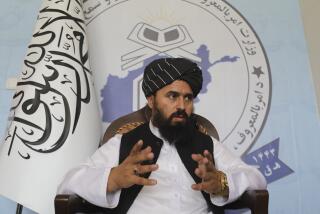Postwar Resource: Muslim Women
- Share via
Since the Taliban overtook Kabul in 1996, Westerners have tended to see Afghan women merely as the victims that they indeed are. Now we must see them as allies.
News from Afghanistan shows jubilant Northern Alliance warriors and the Taliban in retreat. But there is another image: that of women sheathed in the head-to-toe burka, looking as if they might float across this unforgiving moonscape in their sky-blue tents.
The Taliban are from the southern, rural, conservative Pushtun region, where female illiteracy and child brides are features of life.
The concurrence of the Taliban’s zealous harboring of terrorists intent on destroying modernity and the medieval repression of Afghan women is no coincidence. Terrorism in the name of Islam is being cultivated in cultures in which women are shoved into invisibility.
In the governing structure to emerge from the rubble, women’s participation is crucial to stability. Women may not be able to deliver what we want most urgently--Osama bin Laden--but in the long run, we need their moderation as a counter to the turbulence that breeds terror.
Women have wielded this welcome influence throughout the Muslim world. Despite (or in reaction to) the repressive legacy of the Ayatollah Ruhollah Khomeini, Iranian women tipped the presidential election in favor of the more moderate Mohammad Khatami.
Likewise, the female leaders of Bangladesh’s two major political parties, Prime Minister Khaleda Zia of the Nationalist Party and Sheik Hasina Wajed of the Awami League, have stood solidly against terrorism in the face of angry anti-American demonstrations in Dhaka. And the female president of Indonesia, Megawati Sukarnoputri, has met with President Bush in solidarity against terrorism, despite the vitriol of Indonesia’s small but vocal fringe of anti-American extremists.
Leaders of most predominantly Muslim countries know they need to balance desires for Western-style individualism and prosperity with more traditional values of family and spirituality.
Yet negotiating this path is difficult. Moderate leaders trying to maintain ties to the United States while fending off internal threats of terrorism in the name of Islam are engaged in a dangerous high-wire act.
How can we help? We could start at the sprawling refugee camps in Pakistan and Iran, where millions of Afghans--80% of them women and children--are waiting to return to their homeland when the U.S. military campaign has abated. A massive program to educate women and girls in these camps would mean fundamental and positive change in Afghan society.
Fortunately the organizations to provide that education exist, through the United Nations and nongovernmental organizations.
They need funding, but more than that, there must be an understanding that women’s advancement is not just about giving women a fair shake, but about creating a safer, more stable world for us all.
By encouraging more active and integrated participation of women throughout the Islamic world, we can help foster moderation.
The terrorist attacks have broadened our sense of danger. Now we must broaden our understanding of defense, adopting a new “inclusive security” approach that taps those with the greatest stake in stability, Afghanistan’s women.
More to Read
Sign up for Essential California
The most important California stories and recommendations in your inbox every morning.
You may occasionally receive promotional content from the Los Angeles Times.













